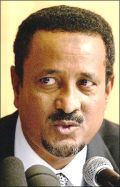Sudan allows freer aid access to entire country
By Opheera McDoom
 KHARTOUM, April 26 (Reuters) – Sudan on Tuesday announced new procedures to simplify aid access to the country to facilitate a huge expected humanitarian operation following a peace deal ending more than two decades of war in the south.
KHARTOUM, April 26 (Reuters) – Sudan on Tuesday announced new procedures to simplify aid access to the country to facilitate a huge expected humanitarian operation following a peace deal ending more than two decades of war in the south.
Sudan signed a peace deal with the former rebel Sudan People’s Liberation Army (SPLA) in January which will usher in a new unity government, and share power and wealth in Africa’s largest country. Donors pledged $4.5 billion earlier this month to assist the reconstruction of the war-torn country.
“We decided to make new procedures and policies in the state to facilitate all humanitarian aid work during this stage of peace,” Humanitarian Affairs Minister Ibrahim Mahmud Hamid told reporters in Khartoum.
The government would immediately begin registration of all aid agencies working in Sudan. The goods they bring into the country will be exempted from all customs and taxes, avoiding lengthy bureaucratic procedures.
Most importantly, Hamid said, was that permission would no longer be needed to travel to areas where there are no security concerns, removing a huge obstacle to aid workers travelling through the vast country.
“During the time of conflict and instability we used to demand from aid workers that they get travel permits from Khartoum,” he said.
“Now we have cancelled these except to go to areas where there are still security issues.”
He said the United Nations had a separate agreement with the government about its operations in the country.
The southern civil war, Africa’s longest, claimed the lives of more than 2 million people, mostly from famine and disease, and forced more than 4 million to flee their homes.
DARFUR
The southern peace deal does not include a separate conflict in Sudan’s remote Darfur region, where tens of thousands have been killed in fighting after rebels took up arms accusing the central government of neglect and of giving preferential treatment to Arab tribes over non-Arabs.
Special procedures to deal with the Darfur humanitarian crisis, where violence has raged for more than two years, would continue for another three months at least, the minister said.
Aid workers travelling to Darfur are guaranteed visas within 48 hours.
That and other procedures to facilitate aid to Darfur, where more than 2 million people have fled their homes to makeshift camps, were put in place after an agreement in May last year with the United Nations.
Health Minister Ahmed Ballal Osman said that mortality rates in the camps in Darfur had fallen below the emergency threshold to less than one per 10,000. “This is now considered a normal threshold for mortality,” he said.
The World Health Organisation is undertaking a second mortality survey in conjunction with aid agencies and the ministry of health in the Darfur camps. The previous survey in August last year, the height of the crisis, found about 10,000 were dying each month in the camps.
Conditions have since improved for those in the camps, although outside the camps many affected by the conflict are still without aid.
Of the about 200,000 refugees who fled the fighting across the border into Chad, UNHCR said in briefing notes sent to Reuters on Tuesday that 20,000 people had returned to Darfur.
But it said it was concerned by the recent burning of abandoned villages, a clear warning to those returnees not to try to go back to their homes.
